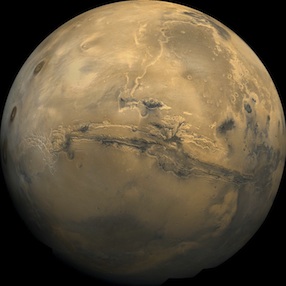
Mars. Credit: NASA
Geological evidence in various places on Mars suggests that Mars was once warmer than now. Such conditions require a thicker atmosphere condition and contain carbon dioxide. At this solar system was young, the composition of carbon dioxide and water is approximately equal to those on Earth.
However, because Mars is farther from the Sun, which means on the cooler side, the atmosphere on Mars could be thicker. However, the climate on Mars became colder. This may occur due to the size of Mars are relatively smaller than the Earth. Initially, the carbon dioxide stored in the form of carbonates as well as on Earth. Carbonate can be found on the planet's crust layer (crust). However, the smaller size of Mars so cold faster, so that the layer of crust is thicker and harder to shift. As a result, there was no tectonic activity resulting in no significant change in the crust. In other words, carbon dioxide is bound in the carbonate remains bound.
Collision with a massive celestial body also cause the loss of the Martian atmosphere. The small size of Mars (ie, gravitational force is also weak), could not resist the release of gas into heat by the impact.
Another factor is the magnetic field. We on Earth are protected from the solar wind thanks to the magnetosphere, the magnetic field that surrounds a layer of planet we live on. As with the Earth, Mars is more exposed to the solar wind. Solar ultraviolet radiation causes the upper layers of the Martian atmosphere is ionized. As a result, without the protection of the magnetosphere, solar wind ions interact with the atmosphere and the sweep.
Tidak ada komentar:
Posting Komentar